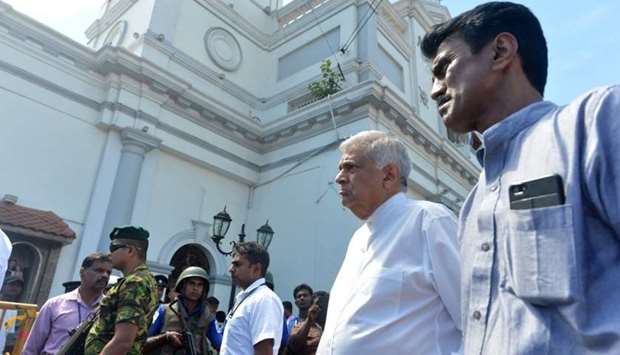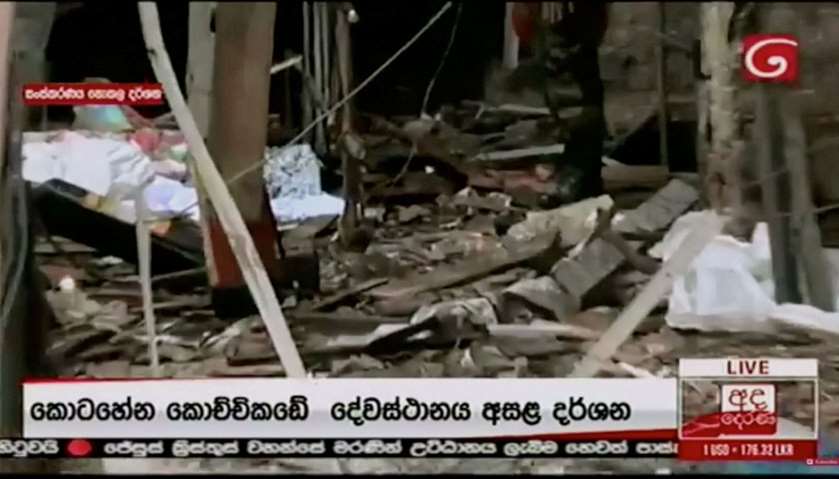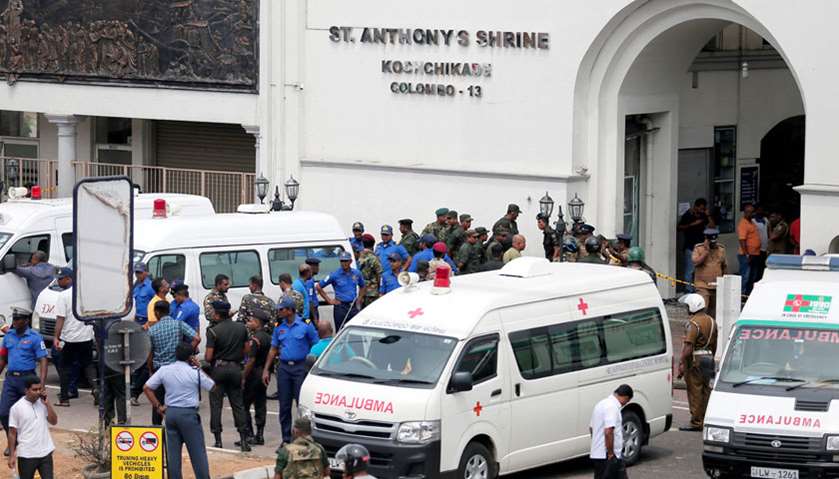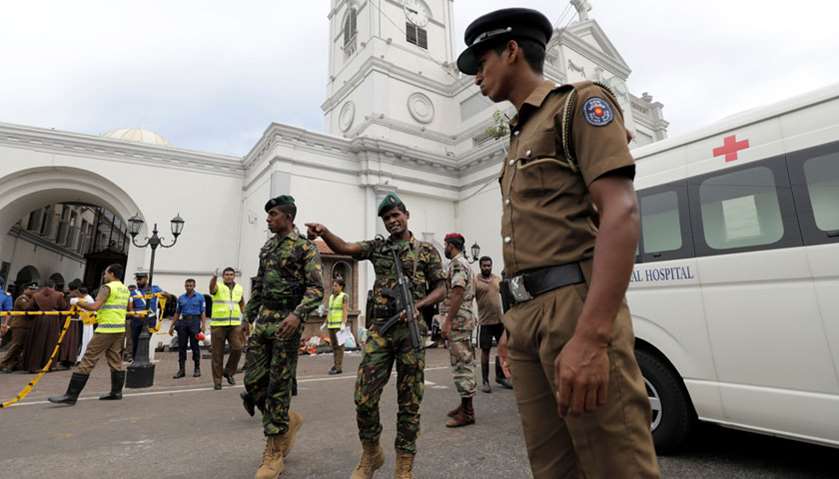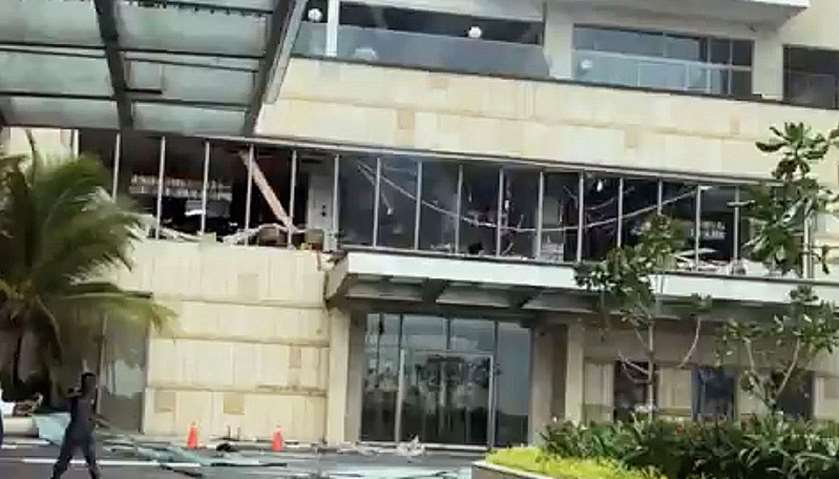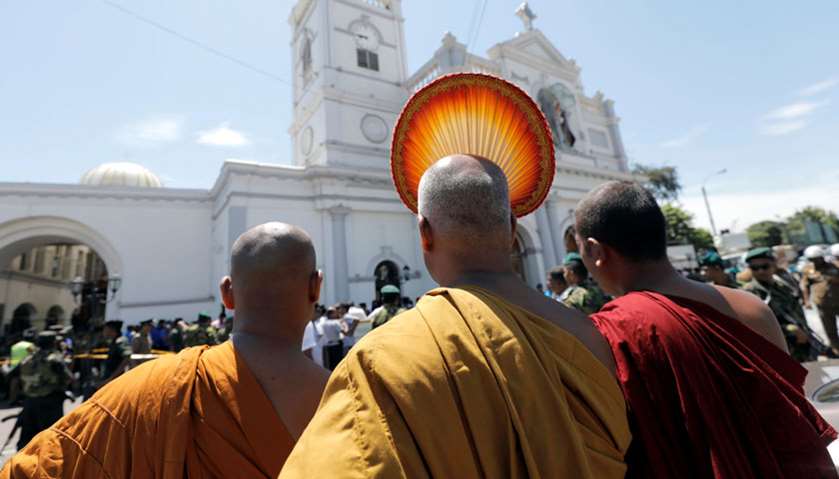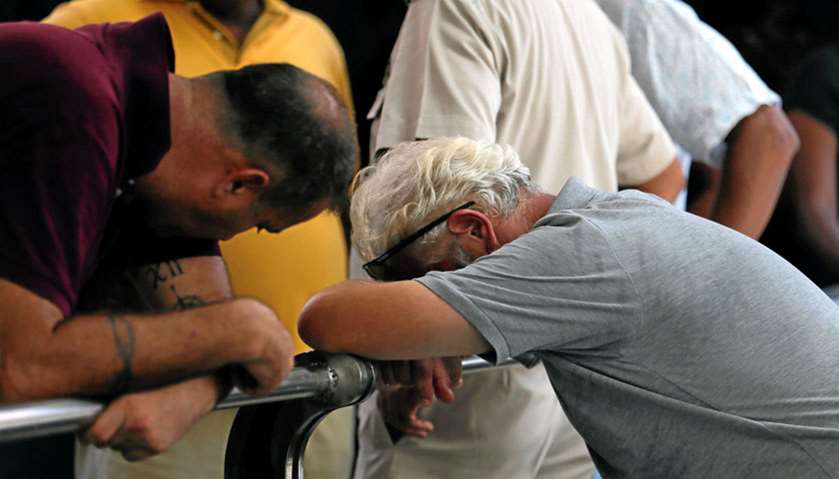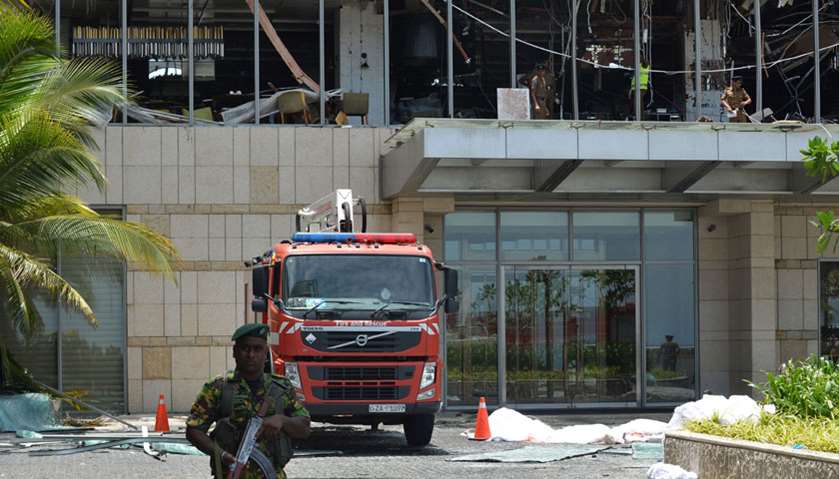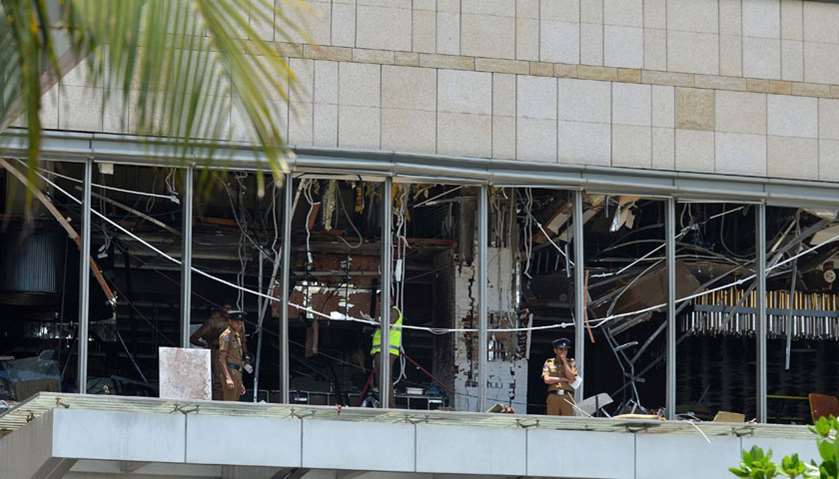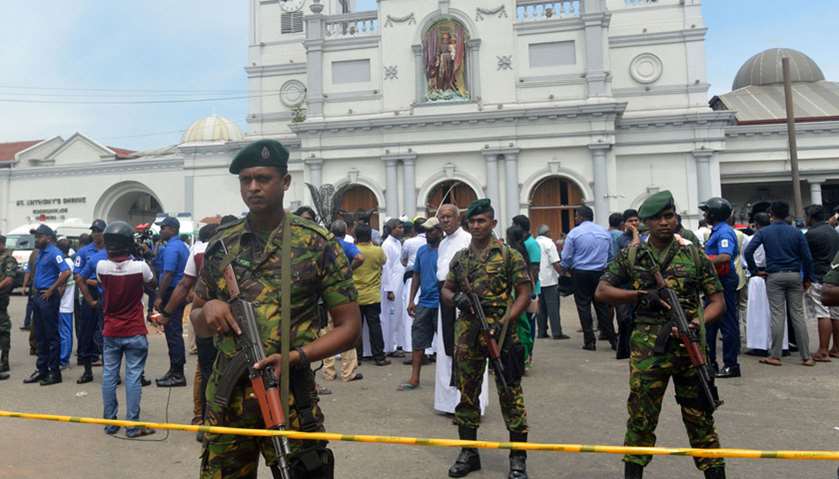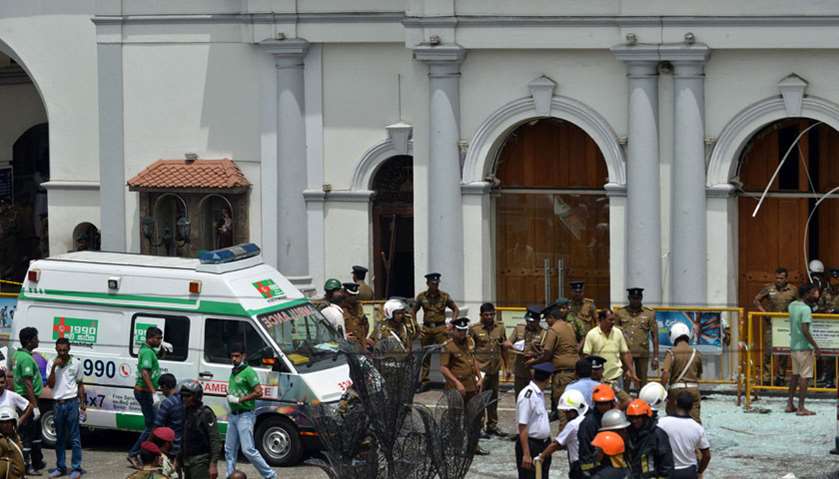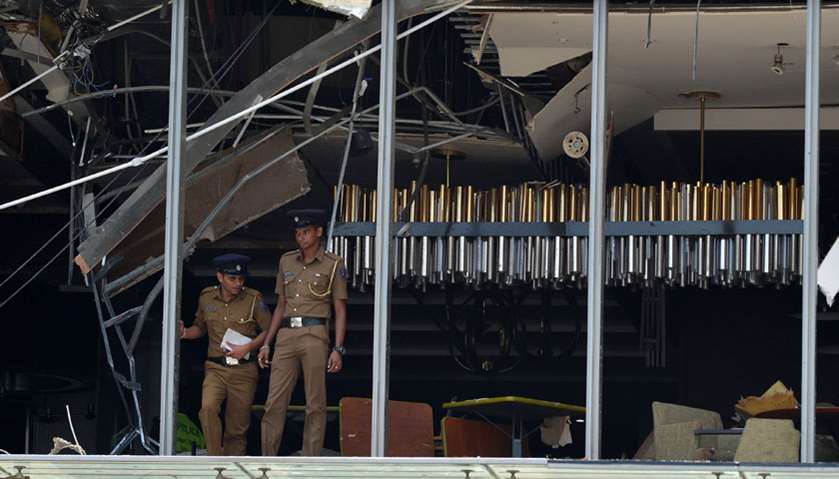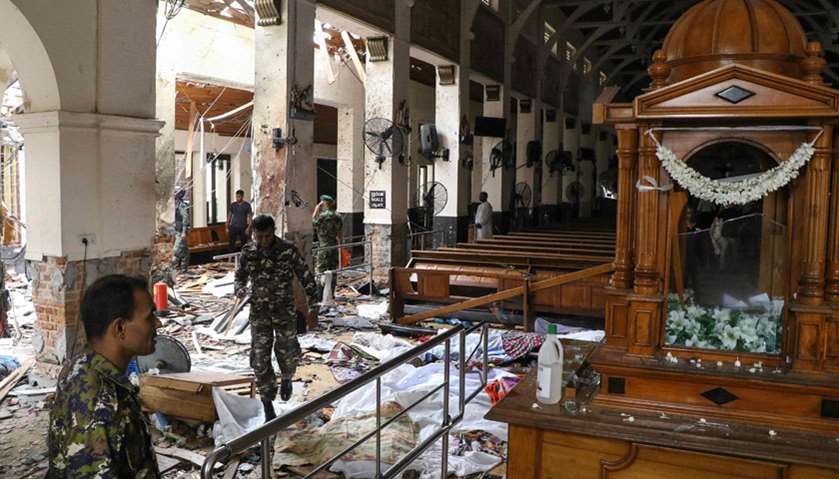* Three police officers killed in raid on Colombo house
* Police say many of the eight bombings were suicide attacks
* No immediate claims of responsibility
* Condemnation pours in from around the world
More than 200 people were killed and at least 450 injured in bomb blasts that ripped through churches and luxury hotels in Sri Lanka on Easter Sunday, the first major attack on the Indian Ocean island since the end of a civil war 10 years ago.
Seven people were arrested and three police officers were killed during a security forces raid on a house in the Sri Lankan capital several hours after the attacks, many of which officials said were suicide bomb explosions.
The government declared a curfew in Colombo and blocked access to social media and messaging sites, including Facebook and WhatsApp. It was unclear when the curfew would be lifted.
"Altogether, we have information of 207 dead from all hospitals. According to the information as of now we have 450 injured people admitted to hospitals," police spokesman Ruwan Gunasekera told reporters.
Three churches in various parts of the country and four hotels in Colombo were hit. At least 27 of the dead were foreigners, including five British people, two of whom had dual U.S. citizenship, and three Indians, according to officials in those countries.
Also among the fatalities were three people from Denmark, two from Turkey, and one from Portugal, officials said. There were also Chinese and Dutch among the dead, according to media reports.
U.S. Secretary of State Mike Pompeo said U.S. nationals were among those killed, but did not give details.
There are 25 unidentified bodies, believed to be of foreigners, at the Colombo Judicial Medical Officer’s mortuary, Sri Lanka's foreign ministry said.
There were no immediate claims of responsibility for the attacks in a country which was at war for decades with Tamil separatists until 2009, a time when bomb blasts in the capital were common.
Prime Minister Ranil Wickremsinghe acknowledged that the government had some "prior information of the attack", though ministers were not told.
He said there wasn't an adequate response and there needed to be an inquiry into how the information was used.
He also said the government needs to look at the international links of a local militant group.
Agence France Presse reported that it had seen documents showing that Sri Lanka's police chief Pujuth Jayasundara issued an intelligence alert to top officers 10 days ago, warning that suicide bombers planned to hit "prominent churches". He cited a foreign intelligence service as reporting that a little-known Islamist group was planning attacks.
A Sri Lanka police spokesman said he was not aware of the intelligence report.
Local Christian groups have said they faced increasing intimidation from some extremist Buddhist monks in recent years. Last year, there were clashes between the majority Sinhalese Buddhist community and minority Muslims, with some hardline Buddhist groups accusing Muslims of forcing people to convert to Islam.
Dozens were killed in one of the blasts at St. Sebastian's Gothic-style Catholic church in Katuwapitiya, north of Colombo. Gunasekera said the police suspected a suicide attack there. Pictures from the site showed bodies on the ground, blood on the church pews and a destroyed roof.
Local media reported 25 people were also killed in an attack on an evangelical church in Batticaloa in Eastern Province.
The hotels hit in Colombo were the Shangri-La, the Kingsbury, the Cinnamon Grand and the Tropical Inn near the national zoo. There was no word on casualties in the hotels, but a witness told local TV he saw some body parts, including a severed head, lying on the ground beside the Tropical Inn.
The first six explosions were all reported within a short period in the morning just as church services were starting.
One of the explosions was at St. Anthony's Shrine, a Catholic church in Kochcikade, Colombo, a tourist landmark.
The explosion at the Tropical Inn happened later and there was an eighth explosion at a house in Colombo. Police and media said that three officers were killed and seven people detained during a raid on this location.
"I strongly condemn the cowardly attacks on our people today. I call upon all Sri Lankans during this tragic time to remain united and strong," said the prime minister in a Tweet.
"Please avoid propagating unverified reports and speculation. The government is taking immediate steps to contain this situation."
President Maithripala Sirisena said he had ordered the police special task force and military to investigate who was behind the attacks and their agenda.
The military was deployed, a military spokesman said, and security stepped up at Colombo's international airport.
Last year, there were 86 verified incidents of discrimination, threats and violence against Christians, according to the National Christian Evangelical Alliance of Sri Lanka (NCEASL), which represents more than 200 churches and other Christian organisations.
This year, the NCEASL recorded 26 such incidents, including one in which Buddhist monks allegedly attempted to disrupt a Sunday worship service, with the last one reported on March 25.
Out of Sri Lanka's total population of around 22 million, 70 percent are Buddhist, 12.6 percent Hindu, 9.7 percent Muslim and 7.6 percent Christian, according to the country's 2012 census.
The heads of major governments condemned the attacks.
US President Donald Trump said America offered "heartfelt condolences" to the Sri Lankan people and stood ready to help, Indian Prime Minister Narendra Modi said there was "no place for such barbarism in our region", and Turkish President Tayyip Erdogan said the bombings were "an assault on all of humanity".
Modi told voters that they needed to elect him to a second term as only he can beat the "terrorists" threatening India. "Should terrorism be finished or not?," he told an election rally in the western state of Rajasthan. "Who can do this? Can you think of any name aside from Modi? Can anybody else do this?"
Pope Francis, addressing tens of thousands of people in St. Peter's Square to hear his Easter Sunday message: "I wish to express my affectionate closeness to the Christian community, hit while it was gathered in prayer, and to all the victims of such cruel violence."
Christians celebrate the resurrection of Jesus Christ on Easter Day after his death on the cross.
Prime Minister Jacinda Ardern of New Zealand, where a gunman shot 50 people dead in two mosques last month, said in a statement: "Collectively we must find the will and the answers to end such violence."
Reaction to Sri Lanka attacks
Politicians and religious leaders were united in their shock and condemnation. Here are some of their reactions.
POPE FRANCIS
"I learned with sadness and pain of the news of the grave attacks, that precisely today, Easter, brought mourning and pain to churches and other places where people were gathered in Sri Lanka," he told tens of thousands of people in St. Peter's Square to hear his Easter Sunday message.
"I wish to express my affectionate closeness to the Christian community, hit while it was gathered in prayer, and to all the victims of such cruel violence."
ARCHBISHOP OF CANTERBURY, JUSTIN WELBY, SPIRITUAL LEADER OF THE CHURCH OF ENGLAND
"The will to power leads to the murder of innocents in Sri Lanka. The utterly despicable destruction that on this holiest of days seeks to challenge the reality of the risen Christ. To say that darkness will conquer, that our choice is surrender or death. Jesus chose to defy this darkness and he is risen indeed."
UN SECRETARY GENERAL ANTONIO GUTERRES
"I condemn the heinous terrorist attacks on churches and hotels in Sri Lanka on Easter Sunday, a sacred day for Christians. The UN stands in solidarity with Sri Lanka as the global community fights hatred and violent extremism together. Holy sites must be respected," he tweeted.
US PRESIDENT DONALD TRUMP
"The United States offers heartfelt condolences to the great people of Sri Lanka. We stand ready to help!," he tweeted.
INDIAN PRIME MINISTER NARENDRA MODI
"Strongly condemn the horrific blasts in Sri Lanka. There is no place for such barbarism in our region. India stands in solidarity with the people of Sri Lanka. My thoughts are with the bereaved families and prayers with the injured," he said on Twitter.
PAKISTAN'S PRIME MINISTER IMRAN KHAN
"Strongly condemn the horrific terrorist attack in Sri Lanka on Easter Sunday resulting in precious lives lost and hundreds injured. My profound condolences go to our Sri Lankan brethren. Pakistan stands in complete solidarity with Sri Lanka in their hour of grief," he tweeted.
CANADIAN PRIME MINISTER JUSTIN TRUDEAU
"Absolutely horrific news from Sri Lanka. Canada strongly condemns the heinous attacks on Christians at churches and hotels. Our hearts & thoughts are with the families & loved ones of those killed and all those injured," he tweeted.
RUSSIAN PRESIDENT VLADIMIR PUTIN
"Vladimir Putin expressed condolences to Sri Lanka President Maithripala Sirisena in connection with tragic consequences of terrorist acts," his English Twitter account said.
GERMAN CHANCELLOR ANGELA MERKEL
"It is shocking that people who had gathered to celebrate Easter were the deliberate target of vicious attacks," she wrote in a letter of condolence to Sri Lanka's president.
FRENCH PRESIDENT EMMANUEL MACRON
"Deep sorrow following the terrorist attacks against churches and hotels in Sri Lanka. We firmly condemn these heinous acts. All our solidarity with the people of Sri Lanka and our thoughts go out to all victims’ relatives on this Easter Day,” he said on Twitter.
BRITISH PRIME MINISTER THERESA MAY
"The acts of violence against churches and hotels in Sri Lanka are truly appalling, and my deepest sympathies go out to all of those affected at this tragic time. We must stand together to make sure that no one should ever have to practise their faith in fear," she tweeted.
SPANISH PRIME MINISTER PEDRO SANCHEZ
"Terror and barbarity will never defeat us," he wrote on Twitter.
LUXEMBOURG PREMIER XAVIER BETTEL
"Even on Easter Sunday, there are those who sow hatred and reap death. The attacks in Sri Lanka churches testify to a real genocide perpetrated against Christians. Let us pray for the innocent victims and work towards religious freedom around the world," he said on Twitter.
EUROPEAN COMMISSION PRESIDENT JEAN-CLAUDE JUNCKER
"It was with horror and sadness that I heard of the bombings in Sri Lanka costing the lives of so many people. I offer my heartfelt condolences to the families of the victims who had gathered to worship peacefully or come to visit this beautiful country. We stand ready to support," he said on Twitter.
TURKISH PRESIDENT TAYYIP ERDOGAN
"I condemn in the strongest terms possible the Easter terror attacks in Sri Lanka. This is an assault on all of humanity," he tweeted.
IRANIAN FOREIGN MINISTER MOHAMMAD JAVAD ZARIF
"Terribly saddened by terrorist attacks on Sri Lankan worshippers during Easter. Condolences to friendly govt & people of Sri Lanka. Our thoughts & prayers with the victims & their families. Terrorism is a global menace with no religion: it must be condemned & confronted globally," he said on Twitter.
NEW ZEALAND PRIME MINISTER JACINDA ARDERN
"New Zealand condemns all acts of terrorism, and our resolve has only been strengthened by the attack on our soil on the 15th of March. To see an attack in Sri Lanka while people were in churches and at hotels is devastating,” she said in a written statement.
"New Zealand rejects all forms of extremism and stands for freedom of religion and the right to worship safely. Collectively we must find the will and the answers to end such violence."
* Police say many of the eight bombings were suicide attacks
* No immediate claims of responsibility
* Condemnation pours in from around the world
More than 200 people were killed and at least 450 injured in bomb blasts that ripped through churches and luxury hotels in Sri Lanka on Easter Sunday, the first major attack on the Indian Ocean island since the end of a civil war 10 years ago.
Seven people were arrested and three police officers were killed during a security forces raid on a house in the Sri Lankan capital several hours after the attacks, many of which officials said were suicide bomb explosions.
The government declared a curfew in Colombo and blocked access to social media and messaging sites, including Facebook and WhatsApp. It was unclear when the curfew would be lifted.
"Altogether, we have information of 207 dead from all hospitals. According to the information as of now we have 450 injured people admitted to hospitals," police spokesman Ruwan Gunasekera told reporters.
Three churches in various parts of the country and four hotels in Colombo were hit. At least 27 of the dead were foreigners, including five British people, two of whom had dual U.S. citizenship, and three Indians, according to officials in those countries.
Also among the fatalities were three people from Denmark, two from Turkey, and one from Portugal, officials said. There were also Chinese and Dutch among the dead, according to media reports.
U.S. Secretary of State Mike Pompeo said U.S. nationals were among those killed, but did not give details.
There are 25 unidentified bodies, believed to be of foreigners, at the Colombo Judicial Medical Officer’s mortuary, Sri Lanka's foreign ministry said.
There were no immediate claims of responsibility for the attacks in a country which was at war for decades with Tamil separatists until 2009, a time when bomb blasts in the capital were common.
Prime Minister Ranil Wickremsinghe acknowledged that the government had some "prior information of the attack", though ministers were not told.
He said there wasn't an adequate response and there needed to be an inquiry into how the information was used.
He also said the government needs to look at the international links of a local militant group.
Agence France Presse reported that it had seen documents showing that Sri Lanka's police chief Pujuth Jayasundara issued an intelligence alert to top officers 10 days ago, warning that suicide bombers planned to hit "prominent churches". He cited a foreign intelligence service as reporting that a little-known Islamist group was planning attacks.
A Sri Lanka police spokesman said he was not aware of the intelligence report.
Local Christian groups have said they faced increasing intimidation from some extremist Buddhist monks in recent years. Last year, there were clashes between the majority Sinhalese Buddhist community and minority Muslims, with some hardline Buddhist groups accusing Muslims of forcing people to convert to Islam.
Dozens were killed in one of the blasts at St. Sebastian's Gothic-style Catholic church in Katuwapitiya, north of Colombo. Gunasekera said the police suspected a suicide attack there. Pictures from the site showed bodies on the ground, blood on the church pews and a destroyed roof.
Local media reported 25 people were also killed in an attack on an evangelical church in Batticaloa in Eastern Province.
The hotels hit in Colombo were the Shangri-La, the Kingsbury, the Cinnamon Grand and the Tropical Inn near the national zoo. There was no word on casualties in the hotels, but a witness told local TV he saw some body parts, including a severed head, lying on the ground beside the Tropical Inn.
The first six explosions were all reported within a short period in the morning just as church services were starting.
One of the explosions was at St. Anthony's Shrine, a Catholic church in Kochcikade, Colombo, a tourist landmark.
The explosion at the Tropical Inn happened later and there was an eighth explosion at a house in Colombo. Police and media said that three officers were killed and seven people detained during a raid on this location.
"I strongly condemn the cowardly attacks on our people today. I call upon all Sri Lankans during this tragic time to remain united and strong," said the prime minister in a Tweet.
"Please avoid propagating unverified reports and speculation. The government is taking immediate steps to contain this situation."
President Maithripala Sirisena said he had ordered the police special task force and military to investigate who was behind the attacks and their agenda.
The military was deployed, a military spokesman said, and security stepped up at Colombo's international airport.
Last year, there were 86 verified incidents of discrimination, threats and violence against Christians, according to the National Christian Evangelical Alliance of Sri Lanka (NCEASL), which represents more than 200 churches and other Christian organisations.
This year, the NCEASL recorded 26 such incidents, including one in which Buddhist monks allegedly attempted to disrupt a Sunday worship service, with the last one reported on March 25.
Out of Sri Lanka's total population of around 22 million, 70 percent are Buddhist, 12.6 percent Hindu, 9.7 percent Muslim and 7.6 percent Christian, according to the country's 2012 census.
The heads of major governments condemned the attacks.
US President Donald Trump said America offered "heartfelt condolences" to the Sri Lankan people and stood ready to help, Indian Prime Minister Narendra Modi said there was "no place for such barbarism in our region", and Turkish President Tayyip Erdogan said the bombings were "an assault on all of humanity".
Modi told voters that they needed to elect him to a second term as only he can beat the "terrorists" threatening India. "Should terrorism be finished or not?," he told an election rally in the western state of Rajasthan. "Who can do this? Can you think of any name aside from Modi? Can anybody else do this?"
Pope Francis, addressing tens of thousands of people in St. Peter's Square to hear his Easter Sunday message: "I wish to express my affectionate closeness to the Christian community, hit while it was gathered in prayer, and to all the victims of such cruel violence."
Christians celebrate the resurrection of Jesus Christ on Easter Day after his death on the cross.
Prime Minister Jacinda Ardern of New Zealand, where a gunman shot 50 people dead in two mosques last month, said in a statement: "Collectively we must find the will and the answers to end such violence."
Reaction to Sri Lanka attacks
Politicians and religious leaders were united in their shock and condemnation. Here are some of their reactions.
POPE FRANCIS
"I learned with sadness and pain of the news of the grave attacks, that precisely today, Easter, brought mourning and pain to churches and other places where people were gathered in Sri Lanka," he told tens of thousands of people in St. Peter's Square to hear his Easter Sunday message.
"I wish to express my affectionate closeness to the Christian community, hit while it was gathered in prayer, and to all the victims of such cruel violence."
ARCHBISHOP OF CANTERBURY, JUSTIN WELBY, SPIRITUAL LEADER OF THE CHURCH OF ENGLAND
"The will to power leads to the murder of innocents in Sri Lanka. The utterly despicable destruction that on this holiest of days seeks to challenge the reality of the risen Christ. To say that darkness will conquer, that our choice is surrender or death. Jesus chose to defy this darkness and he is risen indeed."
UN SECRETARY GENERAL ANTONIO GUTERRES
"I condemn the heinous terrorist attacks on churches and hotels in Sri Lanka on Easter Sunday, a sacred day for Christians. The UN stands in solidarity with Sri Lanka as the global community fights hatred and violent extremism together. Holy sites must be respected," he tweeted.
US PRESIDENT DONALD TRUMP
"The United States offers heartfelt condolences to the great people of Sri Lanka. We stand ready to help!," he tweeted.
INDIAN PRIME MINISTER NARENDRA MODI
"Strongly condemn the horrific blasts in Sri Lanka. There is no place for such barbarism in our region. India stands in solidarity with the people of Sri Lanka. My thoughts are with the bereaved families and prayers with the injured," he said on Twitter.
PAKISTAN'S PRIME MINISTER IMRAN KHAN
"Strongly condemn the horrific terrorist attack in Sri Lanka on Easter Sunday resulting in precious lives lost and hundreds injured. My profound condolences go to our Sri Lankan brethren. Pakistan stands in complete solidarity with Sri Lanka in their hour of grief," he tweeted.
CANADIAN PRIME MINISTER JUSTIN TRUDEAU
"Absolutely horrific news from Sri Lanka. Canada strongly condemns the heinous attacks on Christians at churches and hotels. Our hearts & thoughts are with the families & loved ones of those killed and all those injured," he tweeted.
RUSSIAN PRESIDENT VLADIMIR PUTIN
"Vladimir Putin expressed condolences to Sri Lanka President Maithripala Sirisena in connection with tragic consequences of terrorist acts," his English Twitter account said.
GERMAN CHANCELLOR ANGELA MERKEL
"It is shocking that people who had gathered to celebrate Easter were the deliberate target of vicious attacks," she wrote in a letter of condolence to Sri Lanka's president.
FRENCH PRESIDENT EMMANUEL MACRON
"Deep sorrow following the terrorist attacks against churches and hotels in Sri Lanka. We firmly condemn these heinous acts. All our solidarity with the people of Sri Lanka and our thoughts go out to all victims’ relatives on this Easter Day,” he said on Twitter.
BRITISH PRIME MINISTER THERESA MAY
"The acts of violence against churches and hotels in Sri Lanka are truly appalling, and my deepest sympathies go out to all of those affected at this tragic time. We must stand together to make sure that no one should ever have to practise their faith in fear," she tweeted.
SPANISH PRIME MINISTER PEDRO SANCHEZ
"Terror and barbarity will never defeat us," he wrote on Twitter.
LUXEMBOURG PREMIER XAVIER BETTEL
"Even on Easter Sunday, there are those who sow hatred and reap death. The attacks in Sri Lanka churches testify to a real genocide perpetrated against Christians. Let us pray for the innocent victims and work towards religious freedom around the world," he said on Twitter.
EUROPEAN COMMISSION PRESIDENT JEAN-CLAUDE JUNCKER
"It was with horror and sadness that I heard of the bombings in Sri Lanka costing the lives of so many people. I offer my heartfelt condolences to the families of the victims who had gathered to worship peacefully or come to visit this beautiful country. We stand ready to support," he said on Twitter.
TURKISH PRESIDENT TAYYIP ERDOGAN
"I condemn in the strongest terms possible the Easter terror attacks in Sri Lanka. This is an assault on all of humanity," he tweeted.
IRANIAN FOREIGN MINISTER MOHAMMAD JAVAD ZARIF
"Terribly saddened by terrorist attacks on Sri Lankan worshippers during Easter. Condolences to friendly govt & people of Sri Lanka. Our thoughts & prayers with the victims & their families. Terrorism is a global menace with no religion: it must be condemned & confronted globally," he said on Twitter.
NEW ZEALAND PRIME MINISTER JACINDA ARDERN
"New Zealand condemns all acts of terrorism, and our resolve has only been strengthened by the attack on our soil on the 15th of March. To see an attack in Sri Lanka while people were in churches and at hotels is devastating,” she said in a written statement.
"New Zealand rejects all forms of extremism and stands for freedom of religion and the right to worship safely. Collectively we must find the will and the answers to end such violence."

